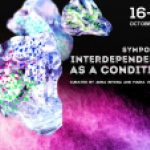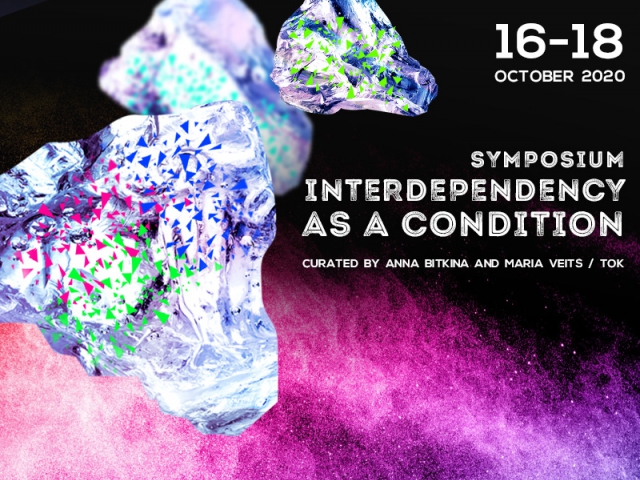Interdependency as a Condition. Symposium as a part of the IV Arctic Art Forum

INTERDEPENDENCY AS A CONDITION
Symposium curated by Creative Association of Curators TOK
October 16-18, 2020
As a part of IV Arctic Art Forum ‘Ecosystems of the invisible’
October 10 - December 30, 2020
LIVESTREAM: in English and in Russian
Curators: Anna Bitkina and Maria Veits / TOK
Speakers: Madina Tlostanova, Ekaterina Sharova, Anna Soloviova, Sergey Medvedev, Taru Elfving, Aslak Aamot Kjærulff, Julian Reid, Susan Schuppli, Kristina Dryagina, Terike Haapoja
Discussants: Anastasia Vepreva, Inga Lāce, Margaret Tali, Egor Rogalev
About Arctic Art Forum
On October 16-18, 2020 TOK Сurators will launch the 2nd curatorial symposium ‘Interdependency as a Condition’1 as a part of the IV Arctic Art Forum Ecosystems of the Invisibl The Forum is an annual event organized by the Arctic Art Institute in Arkhangelsk, Russia since 2016. Its previous three editions were devoted to re-creating the local history of Euro-Arctic Russia after the Soviet experiment, placing the region and the town of Arkhangelsk in the national and international context and in the decolonial discourse, challenging the existing hierarchies in knowledge production and raising questions on sustainability, memory, and amnesia.
About the Symposium
The international curatorial symposium organized, initiated and curated by TOK will serve as a knowledge-production component of the IV Arctic Art Forum by addressing regional issues in relation to the global context through the lens of contemporary curating, artistic production and research, and the potentiality of forms they may take. Landing the symposium on the context of Arkhangelsk and the Arctic region, TOK continues a series of public events about radical democratic structures and projects of contemporary curators, artists and academic researchers that analyze and articulate the conditions of contemporary realities.
Taking as a point of departure the High North and Arctic, an economically and ecologically vulnerable, but crucial for the planetary balance region, the upcoming curatorial symposium will focus on the idea of “interdependency”. In the “transversal” organization of the planet, existing as an entirely immunized and autonomous person, community or country is no longer possible. Separation, even though it’s propagated by right-wing regimes and is stimulated by the pandemic, contributes to approaching climate and political catastrophe. In this situation interdependency becomes a condition2 for further (co)existence in “new”3 and rapidly changing global settings. This year the symposium will be organized in an online format and will have several investigative strands each of which is supposed to give us extra clues for new political and ecological imaginary.
On Conditions: Periphery of Global Capitalism and the Arctic Region
The High North and the Arctic have traditionally been viewed by the center of world capitalism as a resourceful periphery, which needs have been neglected but which land, people and ecosystems have been a target for environmentally dangerous projects masked as necessary and beneficiary developments. A top-down project of a recycling plant in Eco Technopark Shies4 close to Arkhangelsk that was to process tons of waste brought from Moscow or Norilskiy Nickel oil spill in June 20205 that was one of the largest spills of oil products in the Arctic zone in history, posing a threat to the ecosystem of the Arctic Ocean are the cases illustrating the strategies of inner colonization, lack of sustainability and long term thinking in decision making processes. Bringing international critical discourse and knowledge/information exchange to the Russian North (Arkhangelsk) context we attempt to widen the borders of the Nordic region and analyze the hierarchy between Rich North and Poor North (Madina Tlostanova) and the inner colonial processes that led to division, segregation and violent politics both within the Nordic region and Russia, “which feels itself a colony in the presence of the West and projects its own inferiority complexes onto its colonies''.6 In this challenging context, culture can still provide a meeting place for a discussion on decolonizing ecology, sustainable development and shared future.
Shared Forecast: Challenging Geographical, Political and Mental Borders
The event will challenge the political and personal borderlines in the reality ruled by populist leaders and dominated by financial power structures that keep pushing the agenda of national and geographic division that we’re witnessing now in Europe and beyond, while the consolidation of resources, solidarity and exchange of knowledge and information is needed as never. Looking at the common geological, economic and cultural history of the neighboring countries in the North, curatorial symposium aims to reconceptualize the notion of the geopolitical Nordic region in order to meet emergent political, biological and ecological challenges together by broadening channels of knowledge, experience and strategic exchange in the time of complexity and growing anxiety. This is a necessary attempt to address regional interdependency and global economiс processes as well as to call for governmental and corporate responsibility when financial profit is taking over the social economy.
The full program will be announced later in October.
1 The title for the symposium is inspired by recent intervew of Judith Butler for The New Yorker in February 2020 on occasion of the launch of her new book “The Force of Nonviolence" : https://www.newyorker.com/culture/the-new-yorker-interview/judith-butler-wants-us-to-reshape-our-rage
Arctic Art Institute is an international research and project institution started by independent artists, curators and sociologists in Murmansk in 2014. It organizes interdisciplinary art projects in public space and inside the institutions in Russia and Europe, establishes meeting places for progressive art, culture and education professionals from Euro-Arctic Russia and their colleagues in Norway, Sweden, Finland, and the USA. Professionals of the AAI have been active in the border region between Norway, Russia and Finland, creating a cultural dialogue in the challenging, militarized context and have developed research and archival projects of contemporary culture, crafts and underground movements in the Arctic. The Institute explores such themes as sustainable development, cultural diplomacy, knowledge exchange and peaceful coexistence in the North.
Arctic Art Forum is a territory for an interdisciplinary dialogue between art and culture workers in Euro-Arctic Russia, where people-to-people collaboration, international dialogue and openness are key. The previous three editions of the Forum (2016-2018) were devoted to experimental autoethnography and re-creating the cultural history of Euro-Arctic Russia through reviving visual and textual microhistories. The Forum has been created by young artists, and the regional authorities were invited to take part in the dialogue. Another essential effort was to bring attention to the idea of Slow Culture as an alternative to the current economic priorities.
Creative Association of Curators TOK is a nomadic curatorial platform and art organization founded by Petersburg curators Anna Bitkina and Maria Veits in 2010. Based on the principles of social responsibility, sustainability, care and collectivity, TOK projects arise at the intersection of contemporary art and social research and are aimed at studying Russian contemporary sociopolitical processes against the background of global changes. By examining problematic contexts and interacting with various communities, TOK curators test new formats and expand the boundaries of curatorial practice, often creating their projects outside the “white cube”.
Interdependence as a Condition is the second curatorial symposium organized by the curators of TOK in collaboration with institutions of contemporary art. In 2019, within the framework of the 1st Curatorial Forum, organized by the St. Petersburg NCCA, TOK initiated and curated the symposium "Transcending Realities, Overcoming Borders and Creating Structures", which became an important platform for the exchange of knowledge in the field of Russian and international curatorial practice.
Partners:
IV Arctic Art Forum is supported by the Presidential Grants Foundation, Nordic Cultural Foundation, Norwegian Barents Secretariat, and the Ministry of Culture of the Arkhangelsk region.
Press inquiries: mail@arcticartinstitute.com, тел.: +47 45007726



